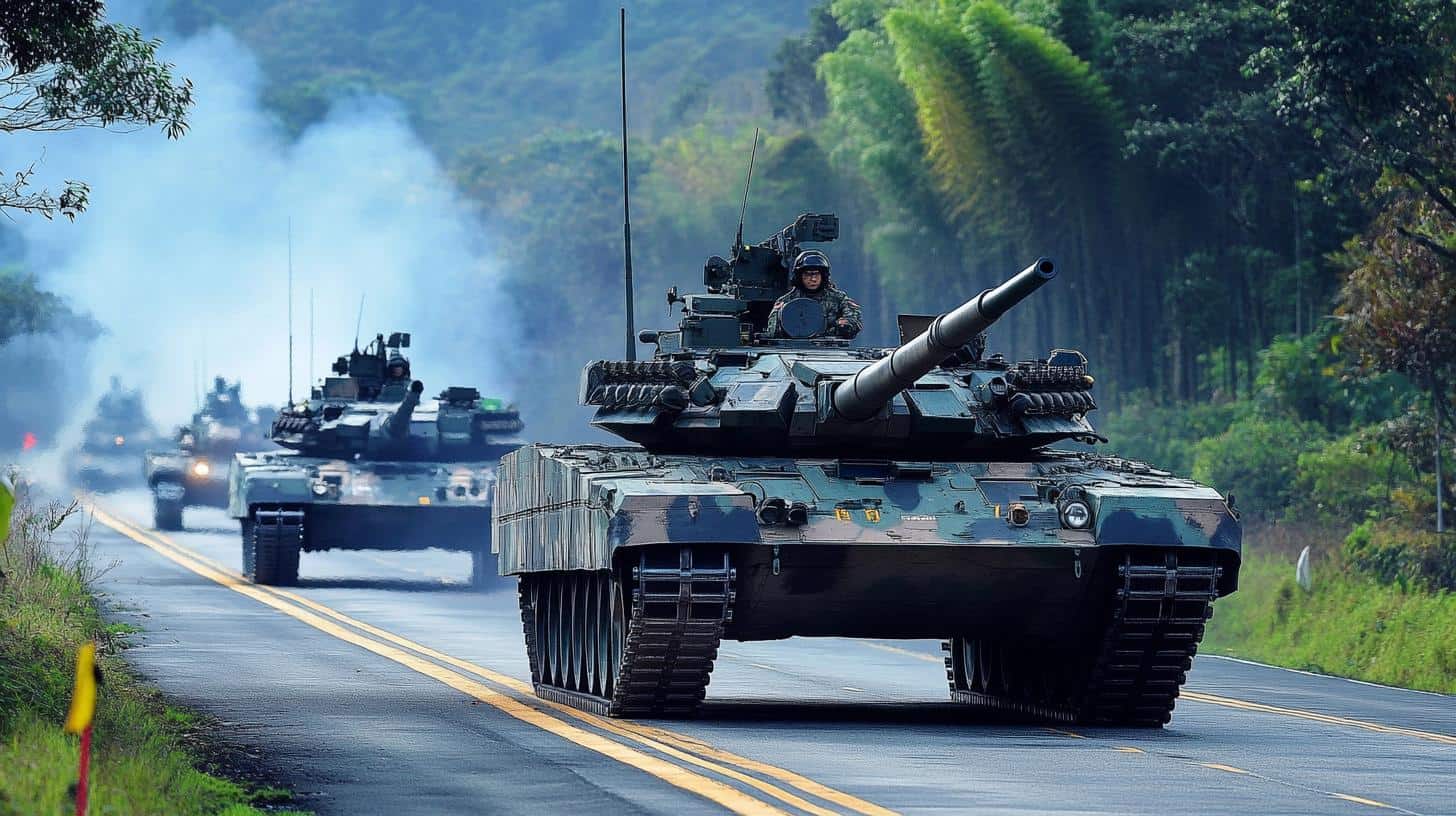Taiwan’s Ministry of National Defense reported a significant uptick in Chinese military maneuvers, with an unprecedented 153 aircraft detected in a single day during China’s extensive military operations. This alert spanned over 25 hours, culminating at 6 a.m. local time, marking a record for such activity in the region.
Among the aircraft observed, a notable 111 breached the unofficial boundary known as the median line, which typically serves as a de facto buffer zone between China and Taiwan. Additionally, the Taiwanese defense authorities noted the presence of 14 Chinese naval vessels near its waters during this time.
In response to these developments, Japan communicated its concerns to China regarding these aggressive military exercises. A spokesperson from the Japanese government emphasized that they are closely watching the situation and have formally raised their unease with Beijing.
The military operation, dubbed “Joint Sword-2024B,” was characterized by China as a warning against any separatist sentiments emanating from Taiwan. Furthermore, Taiwan’s leadership ordered military units to maintain a heightened alert status to ensure the island’s security.
Amidst these rising tensions, several international observers, including the United States and the European Union, have expressed criticism of China’s actions, labeling them destabilizing. Calls for restraint and dialogue echo across diplomatic circles as nations navigate this complex geopolitical landscape.
The Rising Tensions in the Taiwan Strait: Implications for Global Security
The recent surge in military activity by China around Taiwan has far-reaching implications not only for the island nation but also for regional and global security dynamics. With Taiwan’s Ministry of National Defense reporting a historic high of 153 Chinese military aircraft detected in a single day, the situation has escalated into a point of international concern that affects the lives of countless individuals, communities, and nations.
Impact on Taiwanese Society
For the citizens of Taiwan, these military drills serve as a stark reminder of their precarious geopolitical situation. Many Taiwanese are living under the persistent worry of a potential conflict. Daily life is now interspersed with alerts and military drills, which can disrupt education and economic activities. The feeling of insecurity often leads to political polarization among the Taiwanese population regarding how best to respond to threats from China.
The presence of Chinese naval vessels in the vicinity also affects local economies, particularly in sectors like fisheries and tourism, as areas may become restricted due to military exercises. This summer, reports showed a significant decrease in tourist numbers due to fears of escalation in hostilities, impacting local businesses reliant on the tourism sector.
Regional Reactions and Controversies
Countries in the Asia-Pacific region are closely monitoring the situation, and responses vary widely. Japan’s concerns reflect the broader unease among nations that perceive China’s military maneuvers as a potential threat to regional stability. Japan’s integration of national defense strategies includes discussions about enhancing military capabilities and forming stronger alliances with the United States and other nations Japan Times.
However, controversies abound. Some nations are caught in a dilemma where they must balance their economic ties with China against a commitment to defend democratic ideals and allies like Taiwan. Discussions about whether the United States should increase military presence in the region or pursue diplomatic channels create tensions in international relations.
China’s Perspective and the West’s Critique
From China’s perspective, these military drills are conducted under the guise of “maintaining national sovereignty” and countering what it perceives as provocations from Taiwanese separatists. The term “Joint Sword-2024B,” used to describe these operations, suggests a military strategy aimed at projecting power and sending clear warnings to Taiwan and its supporters China.org.cn.
However, the international community, including the United States and the European Union, has criticized these actions as provocations that threaten stability. The call for China to engage in dialogue rather than display military prowess resonates throughout diplomatic circles, as the potential for conflict has global ramifications.
The Path Ahead
As tensions escalate, it becomes imperative for nations worldwide to navigate this complex geopolitical landscape with a focus on dialogue and de-escalation. Increased military readiness in Taiwan and surrounding nations can lead to an arms race, which ultimately affects the security and stability of the entire region.
Understanding the realities on the ground and the impact of these military exercises on everyday lives is crucial for fostering an environment of peace. International cooperation to address these tensions not only serves the interests of nations involved but also safeguards the well-being of numerous individuals and communities affected by the precarious nature of cross-strait relations.
The situation remains fluid, with the potential for sudden shifts that could alter the lives of millions, making it a pivotal moment in both regional and global politics.
The article has been updated: 2024-11-02 22:58
Here are some suggested related links for your post titled “Increased Military Activity Around Taiwan Raises Regional Tensions”:
1. BBC News – Renowned global news source providing detailed analysis and updates on international relations, including tensions in East Asia.
2. Reuters – A leading provider of news and information, offering coverage on military developments and geopolitical issues affecting Taiwan and its neighbors.
3. The Guardian – Comprehensive news platform that covers topics related to military activity, regional security, and political dynamics in the Taiwan Strait.
4. CNN – Major news outlet delivering breaking news and in-depth reports on military actions and their implications for regional stability surrounding Taiwan.
5. Al Jazeera – Engaging news organization providing diverse perspectives on the Asian geopolitical landscape, including Taiwan’s military situation.
6. Financial Times – Focuses on business and economic aspects, offering insights into how increased military activity around Taiwan affects global markets and trade.
7. The New York Times – Esteemed publication covering in-depth stories and analyses related to U.S. foreign policy and military affairs in the context of Taiwan.
8. U.S. Department of Defense – Official government site providing information on U.S. military stance and actions concerning security challenges in the Asia-Pacific region.
9. The Diplomat – An online magazine that provides in-depth coverage of political and military affairs in the Asia-Pacific, with a focus on Taiwan-China relations.
10. Center for Strategic and International Studies (CSIS) – A think tank that offers research and expert analysis on strategic issues, including military activity and tensions around Taiwan.
The article has been updated: 2024-11-06 07:14
What are the implications of the increased military activity around Taiwan for regional stability?
The increased military activity around Taiwan raises significant concerns for regional stability as it may heighten tensions between China and Taiwan, as well as provoke responses from the United States and its allies. This escalation could lead to potential conflicts, destabilize the already fragile situation in the South China Sea, and impact economic relations in the region. Furthermore, it may prompt neighboring countries to bolster their own military capabilities in response, leading to an arms race or increased military alliances, ultimately escalating the risk of armed confrontation.

















